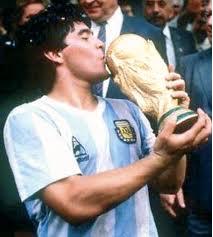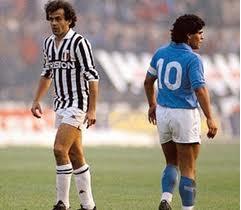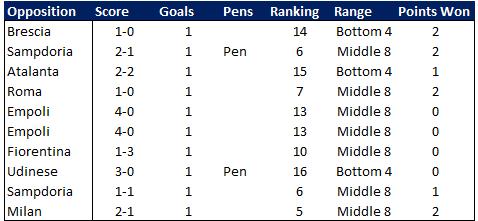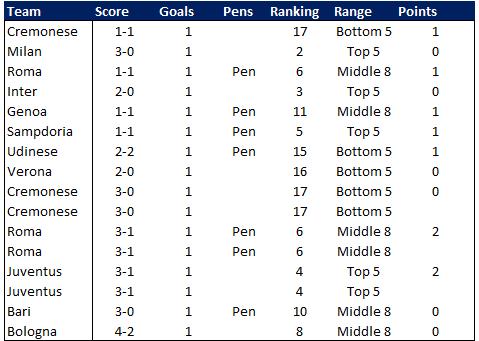It’s long been the biggest debate in Football – who has been the greatest footballer of all time. The debate has generally included Pele, Cruyff, Best, Ronaldo, Zidane, and lately, Messi – but it’s usually Argentina’s Diego Maradona that comes out on top for the oft used line “he won things with poor teams”. Well I’m gonna look into the accuracy of that statement in an attempt to prove it’s relevance to the World’s greatest debate. The teams in question are Argentina’s World Cup winners of 1986, and Napoli’s Serie A winners of 1987 and 1990. I’ll put forward the data, will add my views and will let you decide:
It’s never really been in doubt. Growing up, my Dad told me the following ‘facts’ about football – Maradona was the best player of all time, George Best was the best player from UK & Ireland, and Alan Devonshire was the best player he saw for West Ham (though there was an honourable mention for Sir Trevor Brooking). And that was that. I had no reason to doubt any of that in the last 20+ years of watching football and from what I remember of Maradona in Italia 90 (especially this assist).
But
In my quest/obsession to discover the best big game players of all time, I noticed a few interesting things. I’ve been trawling through all of the data from World Cups, European Championships, Copa Americas, Champions League, Copa Libertadores, and UEFA/Europa League/Cup Winners Cup games and discovered that a) the Top 20 Big Game Players article is going to take me absolutely ages, and b) Maradona isn’t even in the top 25 Big Game players since 1980 (Semi Finals and Finals).
Argentina 1986:
The best place to start is his greatest achievement in football, and the tournament for which he will be most remembered. The idea that he singlehandedly took his teams to glory was created on the back of the World Cup win in 1986 with an “ordinary team”.
Firstly, the defence:
Titles are won built on solid defences, and regardless of whether you have the best player of all time in your team or not, you won’t win anything without a solid defence. As seen from the table above, letting in less than a goal a game will go a long way to winning the World Cup, and the Argentina 1986 team conceded just five goals in their seven games, including three clean sheets. The previous winners Italy conceded six, and West Germany also conceded five on the way to lifting the trophy in 1990.
Secondly, the squad. We’ve already seen the defence were certainly good enough to win a World Cup, and there were also some other noticeable players alongside Maradona. Whilst he top scored with five goals, Jorge Valdano of Real Madrid (no less) also weighed in with four, including one in the Final. Elsewhere there was also quality from Oscar Ruggeri, Jorge Burruchaga and Sergio Batista. This was by no means a squad without talent.
And what of Maradona’s impact? Well it is fair to say that he did have an amazing tournament. He scored one goal against Italy in the group stages, but it was the Quarter Final meeting with England that really won him the plaudits. He scored a brace against a country that Argentina had recently been at war with, including the best goal ever scored in World Cup football. Then in the Semi Finals against Belgium, he scored another brace in a 2-0 win to get his country to the Final. He also grabbed five assists meaning that he either scored or created 10 of Argentina’s 14 goals.
Is there any other player to so dominate a major tournament? Well yes, just two years earlier in fact. Michel Platini lifted the European Championship Trophy for France. Like Maradona, he was an attacking midfielder, but his impact was arguably bigger than Maradona’s in 1986. He scored 9 goals in 5 games for the French including the winner in the Semi Final and the opener in the Final. In fact his career record of 312 goals in 580 games is almost identical when compared to Maradona’s 311 in 589. Platini’s international record was 41 in 72 games compared to Diego’s 34 in 91. Yet France’s Euro 84 winners are best remembered for the midfield four or magic square of Platini, Alain Giresse, Luis Fernández and Jean Tigana. Not one player, despite his massive input.
There’s little doubt that Maradona was the player of the tournament, but did that mean that the rest of the team were poor?
Napoli 1987:
El Diego was celebrating again a year later as he was instrumental in winning Napoli’s first league title. Once again he had a big input in the team’s win. Though was he the one man team he’s made out to be?
Napoli were the best team in Serie A in 1986-87, they won the most games, lost the fewest, and had the best goal difference. They won the league by 3 points, when a win was only worth 2 points. First up – their league record in isolation:
Once again, we’ll start with the defence. As with Argentina’s 1986 World Champions, Napoli’s 1987 Serie A winners were built on one of the strongest defences in the league. Conceding just 21 goals in 30 games (0.7 conceded per game), meant that they had a great base to build on. Of the 30 games, they kept clean sheets in 16 of them. Only Inter Milan (3rd) conceded less goals that season, with 17. So it’s fair to say that the Title Win was built from the back.
Next up, Maradona’s team mates. The team that won the title that year, ended up with 167 Italian Caps between them – hardly average players. The defence contained a young Ciro Ferrara who went on to win a second title with Napoli, and then to won six more with Juventus, along with the 1996 Champions League. Also in the squad were Italian Internationals Salvatore Bagni, Fernando De Napoli, Bruno Giordano (more of him later) and Andrea Carnevale. Not too shabby.
So it’s been established that the team had a fantastic defence and had other quality in Italian internationals. What did Maradona bring? Well, he was the Top Scorer that season and brought 10 goals in 29 appearances – a one in three strike rate. Of the 10 goals, 2 of them were penlties and two of his goals were scored in a 4-0 win over Empoli. So his goals only affected 9 of Napoli’s 30 league games.
As Serie A was made up of just 16 teams that season, I’ve split the opposition range in Top 4, Middle 8 and Bottom 4, and looking at the above, there’s a glaring omission. As someone who is supposed to have singlehandedly won the league for Napoli, he didn’t score in any of the games against their immediate rivals for the titles – Juventus in 2nd, Inter in 3rd and Verona in 4th. His average ranked opponent per goal was just 10.5 out of a 16 team league. They took just one point from Inter and Verona (0-0’s thanks to the defence), and did the double over Juventus – 3-1 away and 2-1 at home. Despite being top scorer, Maradona was not amoungst the 5 goals. Big game player? Maybe not in that season.
Having looked at the opposition he scored against, and that just 8 were from open play/free kicks, how important were his goals? Well as you can see from the above table, his goals were worth 10 points to Napoli, although this doesn’t take into account the part played by the defence in keeping clean sheets. To put the 10 points into perspective, Robin van Persie’s goals this season have been worth 22 points after 29 games. Perhaps not quite he one man team that’s made out.
And lastly, what of the standard of the league that season? Well Napoli’s 45 points with a +20 goal difference would not have been enough for the title in either the season before or the season after.
Without taking away from the achievement, they won less points, less games and scored fewer goals of the previous and following Champions. They were still undoubtedly the strongest team in the 1986-87 season, but their final performance would not have won them the league in most seasons.
So in reflection of the 1986-87 season, it’s fair to say that whilst his contribution was certainly impressive, and he was certainly their best player, he didn’t by any means carry the team to the title. First and foremost, the defence were the foundations of the win, with 16 clean sheets. His team mates were by no means ordinary, and Maradona’s actual performance in the most important games were not the difference. Add to that the lower points tally that won the league and I think it’s fair to say that it was definitely not a one man show.
Napoli 1990:
After the glory of their first title in 1987, Napoli would only have to wait a further three seasons to win their second (and at the time of writing, last) Championship title. Once again, Maradona played a massive part in the 1990 triumph, in what was now a 34 game season (18 team league).
Once again, the title was built on a strong defence. In the 34 league games, they conceded just 31 goals, at a rate of 0.9 goals per game and 14 clean sheets. This was once again the second best defence in Serie A, second only to Milan. It’s once again fair to say that without this defensive display, Napoli wouldn’t have been Champions.
Moving on to his team mates, Napoli had strengthened since the 1987 title. Maradona could now list Brazilian International Careca amongst his team. The striker would score 73 goals for Napoli in just 164 games, as well as 29 in 60 appearances for Brazil. Playing alongside Maradona and Giordano, Careca made the final piece of the famous “Ma-Gi-Ca” attacking trio. Another new name from the 1987 triumph was a young Gianfranco Zola. The future Chelsea legend won the title in his first season with the Naples club. Elsewhere, the club had also strengthened in midfield, with another Brazilian international – Alemao, adding some steel in the middle of the park. In all, the 1990 Napoli squad contained players that would finish with over 280 caps for Brazil and Italy. Maradona was the brightest star, but by no means the only one.
And so after seeing another strong performance from the defence, and an improved squad, what was Maradona’s performance like? After starting the season at 29 – near the peak of most players careers, he enjoyed his best league season for the club, with 16 goals in 28 appearances:
That’s a bit more like it. He managed 5 goals against Top 5 teams including a goal against 2nd placed Milan, and a brace against Juventus. His average opposition was a decent 9.18 when the average excluding first placed Napoli is 10. When the big games came about, he stepped up. You can however point to 7 penalties in the 16 goals. His 16 goals, were worth 9 points to Napoli’s points total of 51.
And once again we can also point to the standard of the contenders that season:
For each of the surrounding seasons, Napoli’s haul of 51 points with a goal difference of 26 would agave meant 2nd place. So when looking at Maradona’s contribution, other factors such as the performance of rivals must be taken into account.
So as with his triumphs in 1986 and 1987, Maradona was undoubtedly instrumental. But they were far from ordinary teams that relied solely on their talisman to inspire. Once again, the defence let in less than a goal a game, the squad had lots of quality in, and the level of opposition was lower than in surrounding seasons. At least in this season, you can point to Maradona’s performance in the big games to show his importance.
Other:
World Cup 1990 – He took Argentina to final but scored no goals
Copa Italia 1987 – 10 games, 7 goals as Napoli lifted the trophy
UEFA Cup 1989 – 3 goals in 12 appearances as they won the trophy
In Conclusion:
There’s no doubt that Maradona is one of if not the greatest footballer there has ever been, no one can argue against that with any real conviction. However, the notion that he’s the greatest because he won trophies with weak teams is not something that can be used in his favour. As seen above, although a key part in each of the trophies he won, he couldn’t have done it without strong defences behind him. He didn’t singlehandedly win the tournaments on his own, when his list of team mates include Valdano, Ferrara, Zola, Careca et al. He didn’t score in either of the World Cup finals he appeared in, and only one of the Semi Finals. When Napoli won the Copa Italia in 1987 over a two legged final, Maradona was not on the scoresheet despite a 4-0 aggregate win. He did score in the UEFA Cup Final win against Stuttgart, but that was from the penalty spot. Comparing him with the other greatest attacking midfielders and in the big games, he comes out a distant second to Zidane. Zizou had 3 World Cup Final goals, a World Cup Semi Final goal, a Champions League Final goal, and 4 in the Champions League Semi finals for good measure. You can also add in a semi final goal in Euro 2000. Maradona on his part has 4 goals in 12 Copa America appearances, which is a long way off Platini’s record in the European equivalent.
So when people point to Messi and say that he can never be considered the greatest because he didn’t win any tournaments with average sides, then who did? If Messi’s Argentina team had the defence that Maradona had behind him, then there’s a good chance they would have gone a lot further in the last two World Cups. The fact that Messi has played his whole career at Barcelona is not a reason to discount his claim to being the greatest.
So there you have it, I’m not disputing his place with the greats, but I would think twice before using the old one man team argument.
Any Maradona fans looking for more, then this is a great site for rare footage of Diego in his prime: http://wn.com/Maradona_87
Cheers,
Liam














